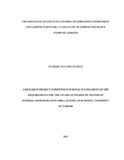| dc.description.abstract | The current state of the economy characterized by information explosion, liberalization, globalization and intense competition from within and outside the country has led many organizations both in the private and public sector to become preoccupied on how to increase the added value of their employees. A need to encourage employees to remain in the organization and to increase productivity beyond that which is at a minimum accepted standard using scarce resources has become a necessity. The issue on labour turnover and employee commitment is critical and managers have to manage employees to minimize turn over since high turnover is not cost effective. The aim of the study was to investigate the influence of locus of control on employee commitment and labour turnover: a case study of Jubilee Insurance Company Limited. The specific objectives were to examine the influence of locus of control on employee commitment in Jubilee Insurance Company Limited in Kenya and to assess the influence of locus of control on labour turnover in Jubilee Insurance Company Limited in Kenya. The study utilized a descriptive survey. This design was considered appropriate for the type of objectives of this study as it enabled the researcher to describe the issues at stake as they exist without manipulation of variables which was the aim of the study. The target population of this research comprised of 400 managers of Jubilee Insurance Company Limited. The study collected primary data using questionnaires. The data collected was coded, quantified and analyzed quantitatively. Quantitative data was analyzed by the use of descriptive statistics namely percentages, means, standard deviations and frequencies. Regression analysis was used to establish the influence of locus of control on commitment and turnover. The study found that the aspect of locus of control that affect turnover is that most people are capable of doing their jobs well if they make the effort. The study also found that the rate of labour turnover had decreased for the last five years between year 2010 and 2014. The study concluded that internal locus of control increases the employee commitment and decreases labour turnover. At 5% level of significance and 95% level of confidence, internal and external locus of control were all significant measures on the employee commitment and labour turnover. The study recommended that organizations should look into their performance management and craft compensation packages that are considered competitive in order to retain its talented workers. | en_US |

